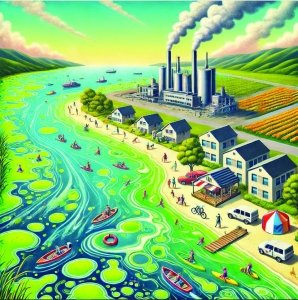


As families flock to beaches for summer vacations, a growing concern looms over the safety of these outings due to the rising threat of deadly bacteria. Recent reports indicate that E. coli and harmful cyanobacteria are causing widespread beach closures across the United States. Climate change is exacerbating this issue, with warmer waters and heavy rainfall contributing to the proliferation of these harmful microorganisms. Between 1985 and 2009, lakes warmed at a rate of 0.6°F (0.3°C) per decade, leading to increased incidences of bacterial contamination. A staggering 87% of the 55 beach closures reported in Massachusetts as of August 16, 2024, were attributed to spikes in bacterial levels [27625dec].
The economic impact of these closures is significant. For instance, Lake Tahoe, a popular tourist destination, generates approximately $5.1 billion in tourism revenue, accounting for 60% of the area's economy. In 2022, Lake Elsinore was forced to shut down for six months due to a bacterial bloom, resulting in a loss of $300,000 in lake use fees. The financial burden of harmful cyanobacterial blooms has been estimated to exceed $1 billion in the U.S. from 2010 to 2020 [27625dec].
In light of these challenges, innovative solutions are being explored. A recent $2 million investment in nanobubble technology aims to combat harmful algae blooms, while efforts to reduce nitrogen and phosphorus pollution are deemed crucial in preventing future outbreaks. Each 1°C increase in water temperature corresponds to an 8% rise in E. coli incidence, underscoring the urgent need for action as climate change continues to affect our water bodies [27625dec].
Simultaneously, beach safety remains a priority for families. Recent incidents in Morecambe Bay, where families were rescued after being trapped on the sands, have prompted local authorities to install warning signs that direct beachgoers to check tide times. This initiative aims to raise awareness about the dangers of venturing onto the sands without proper knowledge [da0edd21].
In Louisiana, parents are reminded to wash shells collected by their children at the beach to prevent unpleasant odors from sea creatures left inside. This serves as a reminder for families to practice beach safety and cleanliness, ensuring a pleasant experience for everyone [3f66d82d].